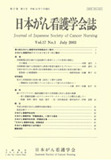Japanese
English
- 販売していません
- Abstract 文献概要
- 参考文献 Reference
- サイト内被引用 Cited by
要 旨
本研究の目的は,手術を受けた成人がん患者が社会復帰する過程で,家族員の患者支援に関わる行動を明らかにし,家族員への看護援助のあり方を検討することである.病名を告知されて手術を受けた成人がん患者の家族員8名を対象に,参加観察法と半構成的面接法により縦断的にデータ収集を行い,質的・帰納的に分析した.
家族員の患者支援の行動は,《1.がん体験者との生活を築く》《2.病気の家族員とともにがんと向き合う》《3.体調を気遣いながら病気の家族員の自立を支える》《4.病気の家族員ががんと共生するよう導く》《5.自分の生き方を貫く》《6.病気の家族員と距離をおいて接する》《7.体調を気遣いながらも病気の家族員の自立に委ねる》の7カテゴリであった.さらに,カテゴリとサブカテゴリを各対象者別に整理・分類した結果,特徴的な2つの群に大別された.カテゴリ1.2.3.4.が大勢を占めるA群と,カテゴリ5.6.7.が大勢を占めるB群であった.
家族員は,がんという病に脅威を感じつつ,自らの生活の中に患者ケアを組み入れていく主体的な取り組みをしており,患者支援行動は,がんという病から命を救うための行動,家族員としての役割認識に基づく行動,家族員自身の生活を守る行動であると捉えることができる.また,A群は患者ケア重視の行動,B群は生活維持重視の行動と捉えることができ,患者支援は2つの行動内容が混在すると考えられる.がん手術後の患者の社会復帰に向けた家族員への援助のあり方は,家族員の行動に応じた方法を柔軟に選択することが重要である.
Abstract
This study aimed to identify behaviors in families supporting adult cancer patients in their rehabilitation following surgery, and nursing care for family members. We examined 8 family members of adult cancer patients who had been diagnosed with cancer and underwent surgery. Data was collected longitudinally using the participant-observation method and semi-structured interviews, and was analyzed qualitatively and inductively.
Supporting behaviors comprised 7 categories : (1) building a new life with the cancer survivor ; (2) facing the cancer together with the patient ; (3) supporting the patient's independence while maintaining concern about his/her condition ; (4) finding ways to coexist with cancer ; (5) allowing family members to maintain separate lifestyles ; (6) keeping the patient at some distance, and ; (7) leaving it to a patient's independence while concerning their condition. These categories and sub-categories were classified every subjects. As a result, subjects were divided into 2 groups. One group A was accounted for the majority of Categories 1-4, whereas another one B was accounted for the majority of categories 5-7.
Although family members displayed fears regarding cancer, they independently brought patient care. Supporting behaviors are with the intention of protecting a patient' life from the cancer illness, based on recognizing the role as a caregiver, and with the intention of sticking to her/his own life. We conclude that behaviors of group A focused more on patient care, while behaviors of group B focused more on lifestyle maintenance. Both types of behavior are present in the provision of support. This study indicates that nurses must choose methods matching family behaviors to allow family members to assist patient rehabilitation.
Copyright © 2003, Japanese Society of Cancer Nursing All rights reserved.


